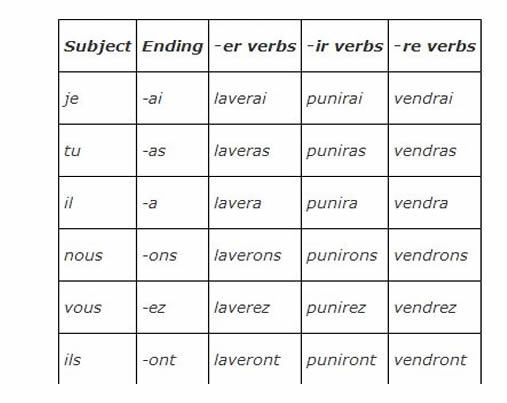Difference between revisions of "Language/French/Grammar/Easy-future"
(Creation of this page) |
m (Quick edit) |
||
| (18 intermediate revisions by 2 users not shown) | |||
| Line 1: | Line 1: | ||
[[File:French-Language-PolyglotClub.png|thumb]] | |||
<div class="pg_page_title">Learn the French Future Tense: The Easy Way! 😍</div> | |||
Hello everyone! | |||
In french, there are many different tenses to learn. | |||
For the future tense, you'll need to learn the different regular endings (verbs in 'er', 'ir'...) plus the irregular forms (être, aller...). | |||
At school, they will teach you things like this: | |||
<hr> | |||
[[File:French-future-tense-polyglot-club.jpg]] | |||
<hr> | |||
In this lesson, I will teach you how to use the future tense without efforts, if you are just starting to learn French and you want to learn quickly. | |||
We will use another technique which is often used by natives. | |||
==Rule== | |||
You have to know the conjugation of the verb "aller" in the present tense. | |||
*Je vais (I go) | |||
*Tu vas (You go) | |||
*Elle / il va (She / he / it goes) | |||
*Nous allons (We go) | |||
*Vous allez (You go) | |||
*Elles / ils vont (They go) | |||
Now you only have to follow this pattern: | |||
<code>Subject + "aller" conjugated in present tense + verb at the infinitiv form</code> | |||
Remember: | |||
*Negation is around the conjugated verb : je ne vais pas manger (I will not eat) / tu ne vas pas boire (You will not drink). | |||
*Questions are formed with the same words : Vas-tu aller au cinéma demain? (Will you go to the theater tomorrow?). | |||
I'll go to the cinéma // Je vais aller au cinéma | ==Examples== | ||
*I'll go to the cinéma // Je vais aller au cinéma | |||
*She will not eat this tomato // Elle ne va pas manger cette tomate (and she's right!) | |||
*Will we see it too? // Allons-nous le voir aussi? | |||
Don't forget the infinitive verb. Else, your sentence will be in the present tense. | |||
Don't hesitate to add some time markers in your sentence (like : Tomorrow, next day, next month...). | |||
With this form, you don't have to know all the different conjugations to be able to speak in the future tense. | |||
This future form works 95% of the time. | |||
==Other Lessons== | |||
* [[Language/French/Grammar/How-to-use-«-il-s'agit-de-»-in-French|How to use « il s'agit de » in French]] | |||
* [[Language/French/Grammar/How-to-Use-Be|How to Use Be]] | |||
* [[Language/French/Grammar/Position-of-subject-pronouns|Position of subject pronouns]] | |||
* [[Language/French/Grammar/"J'ai-eu"-or-"j'avais"|"J'ai eu" or "j'avais"]] | |||
* [[Language/French/Grammar/Adjectives|Adjectives]] | |||
* [[Language/French/Grammar/Ce,-and-compound-forms-of-être|Ce, and compound forms of être]] | |||
* [[Language/French/Grammar/An-adjective-agreeing-with-nouns-linked-by-de|An adjective agreeing with nouns linked by de]] | |||
* [[Language/French/Grammar/Gender-of-the-noun-indicated-by-its-final-letter|Gender of the noun indicated by its final letter]] | |||
* [[Language/French/Grammar/Adverbs-ending-in-—ment-derived-from-words-no-longer-in-the-language|Adverbs ending in —ment derived from words no longer in the language]] | |||
* [[Language/French/Grammar/Adjectives-preceded-by-de|Adjectives preceded by de]] | |||
<span links></span> | |||
Latest revision as of 23:11, 26 March 2023
Hello everyone!
In french, there are many different tenses to learn.
For the future tense, you'll need to learn the different regular endings (verbs in 'er', 'ir'...) plus the irregular forms (être, aller...).
At school, they will teach you things like this:
In this lesson, I will teach you how to use the future tense without efforts, if you are just starting to learn French and you want to learn quickly.
We will use another technique which is often used by natives.
Rule[edit | edit source]
You have to know the conjugation of the verb "aller" in the present tense.
- Je vais (I go)
- Tu vas (You go)
- Elle / il va (She / he / it goes)
- Nous allons (We go)
- Vous allez (You go)
- Elles / ils vont (They go)
Now you only have to follow this pattern:
Subject + "aller" conjugated in present tense + verb at the infinitiv form
Remember:
- Negation is around the conjugated verb : je ne vais pas manger (I will not eat) / tu ne vas pas boire (You will not drink).
- Questions are formed with the same words : Vas-tu aller au cinéma demain? (Will you go to the theater tomorrow?).
Examples[edit | edit source]
- I'll go to the cinéma // Je vais aller au cinéma
- She will not eat this tomato // Elle ne va pas manger cette tomate (and she's right!)
- Will we see it too? // Allons-nous le voir aussi?
Don't forget the infinitive verb. Else, your sentence will be in the present tense.
Don't hesitate to add some time markers in your sentence (like : Tomorrow, next day, next month...).
With this form, you don't have to know all the different conjugations to be able to speak in the future tense.
This future form works 95% of the time.
Other Lessons[edit | edit source]
- How to use « il s'agit de » in French
- How to Use Be
- Position of subject pronouns
- "J'ai eu" or "j'avais"
- Adjectives
- Ce, and compound forms of être
- An adjective agreeing with nouns linked by de
- Gender of the noun indicated by its final letter
- Adverbs ending in —ment derived from words no longer in the language
- Adjectives preceded by de

